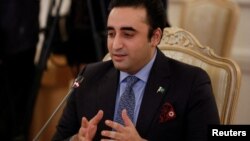Pakistan’s foreign minister, Bilawal Bhutto Zardari, will travel to India early next month, the first visit by a top Pakistani official to the arch-rival neighboring country in almost a decade.
Zadari will visit to attend a meeting of a regional bloc, Shanghai Cooperation Organization, or SCO.
The last high-ranking Pakistani official to visit India was the country’s then prime minister, Nawaz Sharif, who traveled to New Delhi in 2014 for the swearing in of his Indian counterpart, Narendra Modi.
Traditionally strained bilateral diplomatic relations have since deteriorated, fueling military tensions and halting official dialogue for resolving disputes between the nuclear-armed South Asian rival nations.
Foreign Ministry spokeswoman Mumtaz Zahrah Baloch told a weekly news conference in Islamabad Thursday that the SCO foreign ministers’ meeting will be held in the western Indian coastal state of Goa on May 4.
She said Zardari was invited by India’s external affairs minister, Subrahmanyam Jaishankar, in his capacity as the current chair of the SCO Council of Foreign Ministers.
“Our participation in the meeting reflects Pakistan’s commitment to the SCO charter and processes and the importance that Pakistan accords to the region in its foreign policy priorities,” Baloch said.
She declined to say whether Zardari is scheduled to hold bilateral talks with Jaishankar on the sidelines of the multilateral gathering. “In coming days, as decisions are taken, we will be making further announcements,” Baloch said, stressing that the chief Pakistani diplomat is visiting India to attend the SCO conference.
The Shanghai Cooperation Organization is a regional bloc jointly founded by China, Russia, Kazakhstan, Kyrgyzstan, Uzbekistan and Tajikistan in 2001 to promote mutual security, economic cooperation and cultural relations among member nations.
India and Pakistan became full SCO members in 2017.
Both rival nations have a long-standing history of conflicts and acrimony stemming from their territorial dispute over Kashmir. New Delhi controls two-thirds of the Himalayan region and Islamabad the rest.
India and Pakistan claim Kashmir in its entirety and have fought two of their three wars over the region since gaining independence from Britain in 1947.
The dispute almost brought the two countries to the brink of another military conflict in February 2019. Later that year, New Delhi revoked a decades-old special status of Kashmir, further worsening the relationship and prompting Islamabad to downgrade an already tense diplomatic relationship and trade ties with India.
Analysts in India welcomed Pakistan's decision to send its foreign minister to attend the SCO meeting.
"Whether there is a bilateral meeting on the sidelines of the [Indian state of] Shanghai Cooperation deliberations remains to be seen. One can only hope and pray that both countries manage this meeting with dignity minus acrimony," said Amit Baruah, the senior associate editor of The Hindu newspaper.
"It's election season in both countries, which is all the more reason to keep both the volume and the rhetoric low," Baruah said in written comments to VOA.
China maintains close military and economic ties with staunch ally Pakistan. It has recently invested billions of dollars in infrastructure projects in the South Asian neighbor under Beijing’s global Belt and Road Initiative.
Relations between China and India are characterized by both cooperation and competition, as well as occasional military tensions and conflicts. The two countries have engaged in extensive economic cooperation, with Beijing being New Delhi’s largest trading partner.
Military tensions have worsened since 2020, when a deadly clash occurred between Indian and Chinese troops along their 3,440-kilometer disputed border in the Himalayan region. It resulted in the death of 20 Indian soldiers and several Chinese border forces. Another conflict in the area in 2021 injured troops on both sides.
The tensions have prompted China and India to increase their regional military presence.







